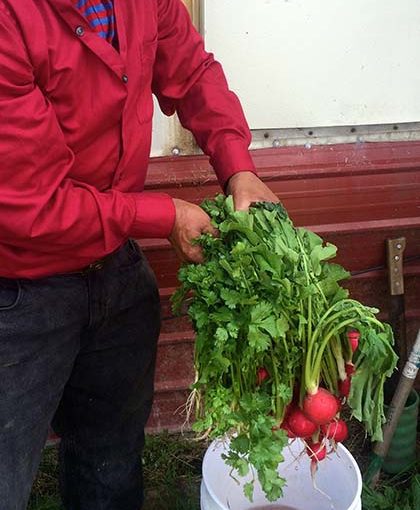Jan 4, 2021New Vermont grant funds food access for Latinx farmworkers
University of Vermont Extension recently received a $62,469 grant to support food security for the Latinx migrant farmworker community in Vermont.
The grant from Shaw’s Nourishing Neighbors Community Relief Initiative will be used to facilitate access to food for 400 farmworkers and their family members, primarily in areas with a Shaw’s Supermarket. However, other gift funds will be used to ensure that anyone in the target audience will receive assistance regardless of location.
Efforts will be coordinated across three farmworker health and education programs, University of Vermont (UVM) Extension’s Bridges to Health, the New England High School Equivalency Program and the Migrant Education Program, in partnership with other organizations and programs.
“Many farmworkers experience significant obstacles in accessing food, particularly fresh, nutritious food, due to lack of personal transportation, long work hours, low hourly earnings and language barriers,” Naomi Wolcott-MacCausland, migrant health coordinator with Bridges to Health, notes. “The grant will be used to pilot a food access project that directly addresses food needs among the state’s marginalized and underserved Latinx migrant farmworker community.
“We will work with UVM Extension’s Community Horticulture Program and Expanded Food and Nutrition Education Program,” she notes, “along with local and regional food banks, gleaning projects and other COVID food access efforts.”

The project will lay the foundation for ongoing food security work by improving access to fresh produce and dry goods, including through an expandedvolunteer network that will collaborate with local food shelves and gleaning projects to offer home deliveries of culturally familiar foods to food-insecure households. In addition, local food shelves and regional hubs will receive training to increase their capacity to serve the Latinx community.
The funding also will be used to develop educational materials in Spanish that facilitate access to food through food shelves and home gardens. It will support season extension activities with participants of Huertas, a kitchen garden project, to reach more households and to recruit Spanish-speaking Extension Master Gardener volunteers to provide technical assistance and information on basic home vegetable gardening in Vermont’s climate.
“Bilingual food access coordinators will be hired,” Wolcott-MacCausland adds, “to work with families to provide guidance and education to navigate state and federal food programs and assist with applications. They also will assemble basic food baskets for distribution to new arrivals and help enroll children of non-English speaking parents in free and reduced lunch programs.”
The project also will seek input from Latinx farmworkers in order to advocate for the inclusion of a wider variety of culturally familiar foods at food shelves and grocery stores.
To learn more about UVM Extension’s efforts to improve access to food, healthcare and education for migrant workers, go to http://go.uvm.edu/farmworker.
















